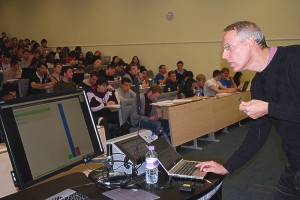LectureTools in use
 I’ve previously posted about LectureTools, an online alternative to electronic voting systems such as Turning Point which use dedicated ‘clickers’. We currently have a site licence for LectureTools on a trial basis. The company, spun out of the University of Michigan, is now owned by Echo360 which provides the hardware and software behind our ReVIEW lecture capture service.
I’ve previously posted about LectureTools, an online alternative to electronic voting systems such as Turning Point which use dedicated ‘clickers’. We currently have a site licence for LectureTools on a trial basis. The company, spun out of the University of Michigan, is now owned by Echo360 which provides the hardware and software behind our ReVIEW lecture capture service.
There are now several academics actively using LectureTools, including Andy Bayley (School of Business and Enterprise) and Prof Chris Szejnmann (Politics, History and International Relations – pictured here). Chris was, with his colleague Dr Marcus Collins, one of the pioneers of lecture capture at Loughborough back in 2009, on the same ‘Modern Europe’ module where he has now started using LectureTools.
The system, which is now integrated into Learn (our Moodle installation), allows Chris to upload his lecture Powerpoint presentation, add question slides of various types, and link it to the module page on Learn.
Students bring their laptops and tablets into the lecture theatre, log into Learn, follow the link to the presentation, and can then respond to questions as and when appropriate – using their own devices rather than University-owned clickers. This is potentially more convenient for all concerned, but in addition it makes it possible to ask students to submit text responses. They can even indicate privately to the lecturer if they find a slide confusing. They can also make, save and print out their notes online next to the appropriate slide.
The feedback so far from Chris and Andy, and from students themselves, has been positive, although there have been one or two technical issues which we’d hope to iron out as we build up experience of using the system.
Chris’ comment to me after his first lecture (which I sat in on) was that “this is a gamechanger”. I agree – especially when it is integrated into the Echo360 lecture capture system, as the company are planning for next year. Students will then be able to view their notes after the lecture against the appropriate segment of the captured lecture.